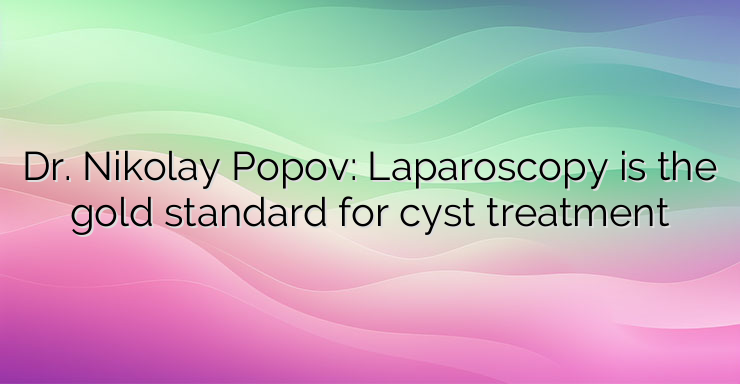Dr. Nikolay Popov is a specialist in obstetrics, gynecology, endoscopic surgery and sterility. Since 2009, he has been the head of the “Endoscopy Department” at the OB Department at the “Vita” General Hospital. Dr. Popov specializes in laparoscopic surgery in Germany and France, reproductive medicine and ART technologies, as well as endoscopic surgery in Great Britain. International experience and daily work make him one of the most popular laparoscopy specialists in Bulgaria. – Dr. Popov, how often should a woman have preventive gynecological examinations? Prevention is important for early diagnosis and more effective treatment of a number of diseases. All age groups of sexually active women are subject to preventive gynecological examinations at least once a year. They should include clinical examination, ultrasound examination, pap smear, vaginal discharge. If necessary, colposcopy, hormone tests, etc. Of course, all girls and women who have any complaints, regardless of their age, should visit the gynecologist. – What types of cysts are there and what are the reasons for their appearance? The patient’s age, clinical complaints, sonographic appearance and values of specific laboratory tests are essential for the diagnosis and therapeutic behavior of cysts. At a young age, there are patients with irregular or absent menstrual cycles, male-type hair, skin changes, and a characteristic ultrasound image of the ovaries. These symptoms are most often associated with polycystic ovaries. Another common variety is follicular cysts, the result of missed ovulation. Cysts of the corpus luteum are a third type of cyst in which the corpus luteum formed after ovulation does not undergo reverse development. Dermoid cysts are discovered accidentally during a preventive examination, usually without significant complaints. They develop from embryonic tissues and, due to their higher oncological potential, must be operated on. Endometriosis (chocolate) cysts are also becoming more common. In recent years, endometriosis is a dominant disease, leading to sterility and persistent pain that does not respond to conservative treatment. In fact, ovarian tumors or as they are better known – cysts – can be at least 10 more types. – Can an ovarian cyst develop into cancer? There is such a risk, especially with prolonged “observation” of the cysts. Ovarian cancer usually affects women over the age of 40, but unfortunately, it is increasingly occurring in younger women. The modern standard is to observe an ovarian cyst for 3-4 months and, if it does not disappear, to intervene. NEWS_MORE_BOX – What are the cyst treatment methods? Usually, the treatment is conservative, with hormonal preparations, for a period of 3 months. This is not applicable to endometriotic, dermoid and cysts suspected of malignancy. However, cysts larger than 3-4 cm that do not respond to hormonal treatment must be surgically removed.Modern medical standards require laparoscopic operations. They are proven to be effective, with painless postoperative recovery and minimal risk of complications leading to reproductive problems among a large proportion of young women. Laparoscopic surgery is the gold standard for endometriosis as well. Endometriosis causes adhesions and in about 50% of cases it leads to sterility. – Why choose laparoscopic (bloodless) rather than standard (open) surgery? Laparoscopic operations are performed through several small openings in the abdominal wall with special instruments, and through one of these openings, optics connected to a camera are inserted, with the help of which the operators follow the progress of the operation in detail on a monitor. The advantages are indisputable: blood loss and tissue trauma are minimal, recovery is quick, and the risk of inflammatory complications and postoperative adhesions in the abdominal cavity is minimized – an important indicator of fertility preservation. – What are the advantages of hysteroscopic operations? Hysteroscopy can be both a diagnostic and a surgical treatment method, and its access is through the woman’s vagina. In addition to being the most gentle, this approach is also the most informative about diseases or abnormalities inside the uterus (myoma nodes, endometrial polyps, adhesions, septa, etc.). Easy access and the ability to switch from diagnostic to surgical activity is a great advantage. – What operations via endoscopic access do you perform at “Vita” Medical Center? At Vita Medical Center we perform laparoscopic operations for infertility, endometriosis, fibroids, cysts, as well as laparoscopic hysterectomies. Diagnostic and operative hysteroscopies for infertility, endometrial polyps, fibroid nodes, septa, etc. Of course, in addition to endoscopic ones, Vita Hospital also offers conventional methods for the treatment of a number of gynecological diseases.and access to it is through the woman’s vagina. In addition to being the most gentle, this approach is also the most informative about diseases or abnormalities inside the uterus (myoma nodes, endometrial polyps, adhesions, septa, etc.). Easy access and the ability to switch from diagnostic to surgical activity is a great advantage. – What operations via endoscopic access do you perform at “Vita” Medical Center? At Vita Medical Center we perform laparoscopic operations for infertility, endometriosis, fibroids, cysts, as well as laparoscopic hysterectomies. Diagnostic and operative hysteroscopies for infertility, endometrial polyps, fibroid nodes, septa, etc. Of course, in addition to endoscopic ones, Vita Hospital also offers conventional methods for the treatment of a number of gynecological diseases.and access to it is through the woman’s vagina. In addition to being the most gentle, this approach is also the most informative about diseases or abnormalities inside the uterus (myoma nodes, endometrial polyps, adhesions, septa, etc.). Easy access and the ability to switch from diagnostic to surgical activity is a great advantage. – What operations via endoscopic access do you perform at “Vita” Medical Center? At Vita Medical Center we perform laparoscopic operations for infertility, endometriosis, fibroids, cysts, as well as laparoscopic hysterectomies. Diagnostic and operative hysteroscopies for infertility, endometrial polyps, fibroid nodes, septa, etc. Of course, in addition to endoscopic ones, Vita Hospital also offers conventional methods for the treatment of a number of gynecological diseases.


Leave a Reply